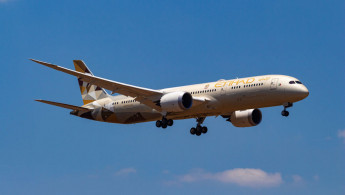The Abu Dhabi-based airline "will launch daily scheduled year-round flights to Tel Aviv", it said in a statement.
It added the service will begin on March 28 - a date that will fall approximately six months after the UAE signed a US-brokered deal to formalise relations with Israel, the first such accord between a Gulf nation and the Jewish state.
"The commencement of scheduled flights is a historic moment and as an airline, cements Etihad's commitment to growing opportunities for trade and tourism," said Mohammad al-Bulooki, Chief Operating Officer of Etihad Aviation Group, according to the statement.
In a video on Twitter, the airline showed a member of cabin crew presenting a quick guide to the city of Tel Aviv.
A small graphic image in the video read "Second Temple", which appears to be an attempt to mention the country's rich archaeological treasures, though the temple itself was destroyed in 70 CE. The video was removed hours later.
Dubai's budget airline flydubai had already announced that it would start direct flights to Tel Aviv this month, operating 14 flights a week.
Unlike Dubai and the other emirates that make up the UAE, Abu Dhabi has placed stringent coronavirus restrictions on entering the city.
With their economies hard hit by the coronavirus pandemic, the UAE and Israel are hoping for rapid dividends from the normalisation deal.
They have already signed treaties on direct flights and visa-free travel, along with accords on investment protection, science and technology.
The UAE was only the third Arab country to normalise ties with Israel following Egypt in 1979 and Jordan in 1994.
However, its move was quickly followed by Bahrain and last month Sudan also announced it would normalise ties.
The agreements, which have been roundly condemned by the Palestinians, break with years of Arab League policy on the Israeli-Palestinian conflict.
The consensus had been that there should be no relations with Israel until it makes peace with the Palestinians.
Follow us on Facebook, Twitter and Instagram to stay connected





 Follow the Middle East's top stories in English at The New Arab on Google News
Follow the Middle East's top stories in English at The New Arab on Google News
![Both Hamas and the Palestinian Authority welcomed the ICC arrest warrants [Getty]](/sites/default/files/styles/image_330x185/public/2024-11/GettyImages-2178351173.jpg?h=199d8c1f&itok=TV858iVg)

